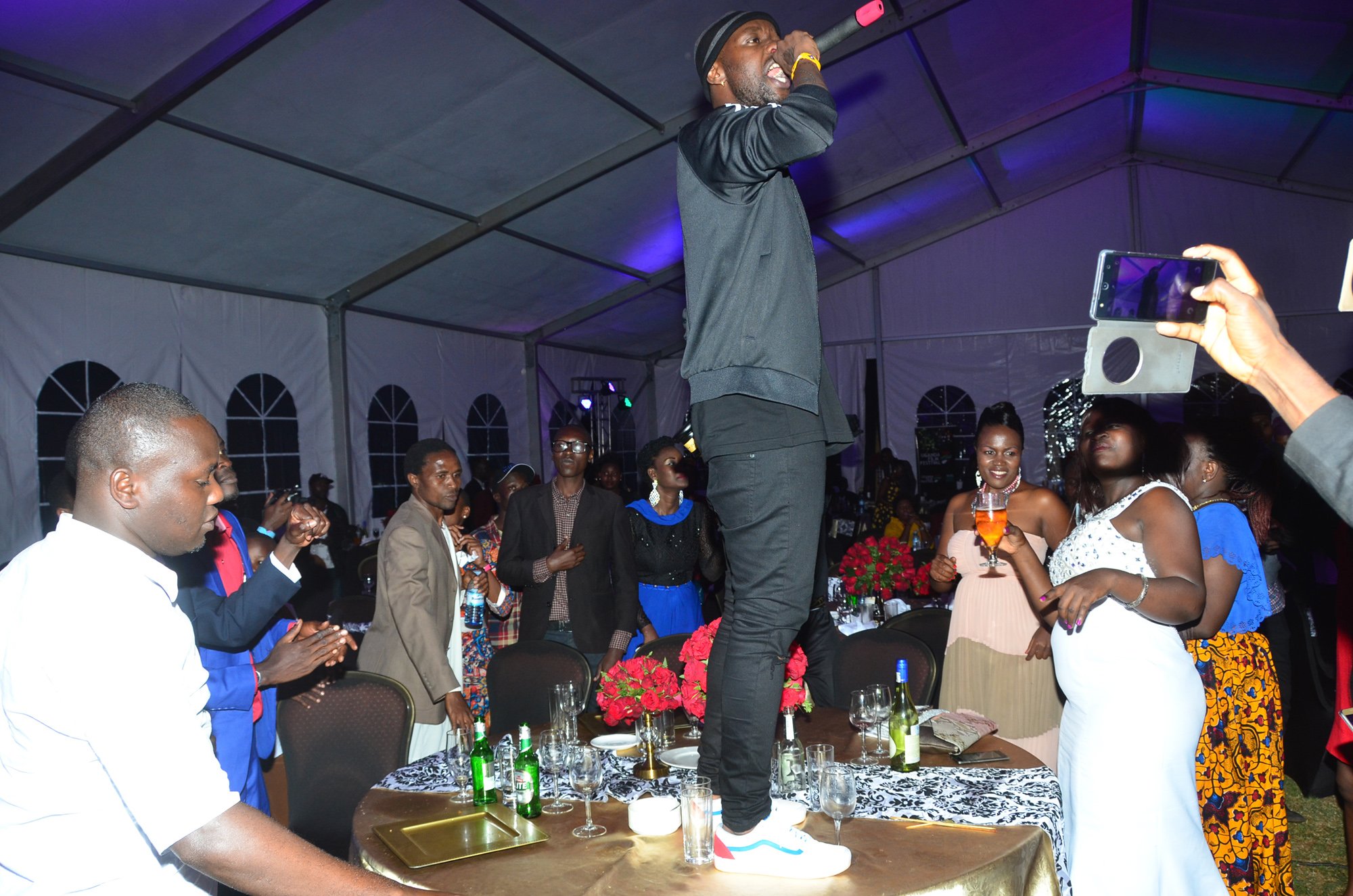Prime
Not yet Uhuru for East Africa’s ultimate Grammy victory

Artiste Edrissa Musuuza, alias Eddy Kenzo. Whereas his two initial songs did not pick any steam, Sitya Loss didn’t come up against only local artistes. PHOTO/FILE/COURTESY
What you need to know:
South African duo of Nomcebo Zikode, Zakes Bantwini and Wouter Kellerman beat Kenzo and three other nominees to the Grammy Award for the Best Global Music Performance for their song, Bayethe
Eddy Kenzo tatya loss, a Muganda would say. He “doesn’t fear to lose”.
But inside the Crypto.com Arena in downtown Los Angeles on February 5, the Recording Academy didn’t want to know. Even if one had reminded them that Kenzo went global in 2014 with the song, Sitya Loss, they still wouldn’t care.
Add that Kenzo is an artiste who has refused to fail because few can explain how far he has come and still the Recording Academy wouldn’t care.
South African duo of Nomcebo Zikode, Zakes Bantwini and Wouter Kellerman beat Kenzo and three other nominees to the Grammy Award for the Best Global Music Performance for their song, Bayethe.
Eddy Kenzo, born Edirisa Musuuza, had been nominated for his duet, Gimme Love, alongside American Matt B. His was Uganda’s first Grammy nomination by any measure. A win would have also seen East Africa receive its first individual statuette of the golden gramophone.
But Beyethe was in its own class.
Grammywinning flutist Kellerman, platinum-selling groovesmith Bantwini and international hit ‘Jerusalema’ songbird Nomcebo left the rest with no chance on Sunday.
Beyethe is a song that caresses you with soulfulness to reflect on the hardship we live in today. ‘Bayethe’, a powerful Zulu Royal salute of ‘Hail’, is a distinct call to action to the world “to lighten our loads, to heal, and bring peace and happiness,” Kellerman.
The flutist, who won a Grammy for “Winds of Samsara”, his 2014 collaborative album with Indian composer and producer Ricky Kej, says they used Beyethe to create a platform asking humanity to stand strong in the face of a global pandemic such as is Covid-19, and wars.
“‘Bayethe’ aligns to key and critical messages to the human race: We have battled. We endure.
We shall rise again. Bayethe!” Kellerman says.
East Africa wallows in pity
The Grammy’s highly coveted individual statuette has eluded the region in ways that not even three Grammys by Kenyan trumpet wizard and producer Owuor Arunga can console.
Kenyan band Sauti Sol has also received a certificate from the Recording Academy for featuring in Nigerian Burna Boy’s Twice As Tall album that won the Grammy in 2021.
But there remains a sense of emptiness in music fans that would reel off names like Diamond Platinumz, Khadja Nin, Wyre, Nameless, Knowless Butera, Jose Chamelone, Harmonize, and Victoria Kimani and wonder why none of them all have been “good enough.”
The award is the most prestigious honour in the world of music and reflects the judgment of peers that one’s creative contributions merit recognition of the highest order.
But not many East African artistes are being nominated to begin with.
Besides Kenzo, Jabali Afrika in 2021 for the Best Children’s Music Album Category, and Victoria Kimani whose album Afreaka was nominated for a Grammy in 2020, the rest of the lot has been affiliated to other musicians.
Kenyans Michael Kennedy, aka Naiboi, Michael Bundi and Wyre, as well as Tanzanian singer Nandy earned their 2022 nomination through an album they were featured in by Jamaican singer Etana.
There was the Abayudaya (Ugandan Jews) nominated for the Best Traditional World Music category for their albumin Uganda in 2005. But the Recording Academy credited it all to Jeffrey A. Summit, a rabbi and associate professor of music and Judaic studies.
“An accomplished musician in his own right, Summit does not perform on the album. Rather, he recorded, compiled and annotated the music of the Abayudaya people. As producer, he is the sole nominee for the album,” noted US’s Tufts University’s newspaper Tufts Daily then.
From Tanzania, Bongo Flava artiste Diamond Platnumz celebrated becoming the first ever Tanzanian artist to perform at the Grammys Global Spin.
Congolese deejay and producer Danny Maombi, aka DJ Nach Mao, recently told this writer that most artists in the region produce party music. These are songs that target the mood in the clubs and have the shelf life of a broken egg.
However, this does not explain why Nameless’ Sinzia or Khadja Nin’s Mama, Sambolera, Wale Watu and Sina Mali Sina Deni could not make it that far.
“What accounts for the few Grammy nominations in our region is the difficult process of becoming a member of the Academy to qualify to be nominated or even win a Grammy,” says Benon Mugumbya, a musician and production director at Swangz Avenue.
“So it's not a matter of whoever puts out music stands a chance to be nominated.”
The Recording Academy offers three types of membership. There is the Voting Membership for performers, songwriters, producers, engineers, instrumentalists, and other creators working in the recording industry.
The others are Professional Membership for music businesspeople, and Grammy U for the next generation aspiring to a career in the music industry.
Besides demanding that one has to be a “musician of high standing,” a new member submission includes two recommendations by existing members and a profile.
The Recording Academy does not publicise the list of its members so it is difficult to tell if regional artists are even members. In 2018, the Academy called for submission of interest for 900 music creators of diverse backgrounds to join its membership.
In 2021, Kenyan Afrofusion singer Joseck Asikoye, aka Muzi, joined a panel that selects nominees and winners of the Grammys.
The Academy chief executive, Harvey Mason Jr, had been forced to make changes following outcry over the lack of transparency in the process.
“East Africa not featuring prominently is not because of the music we produce but lack of enough representation,” says Muzi.
“We are in a bubble that doesn’t resonate with the rest of the global markets and we sometimes pay too much attention to popular music trends and forget that the Grammys are not about popularity.”
Citing Burna Boy’s hugely popular Last Last hit that lost to Bayethe in the same category with Kenzo, Muzi said popularity means nothing in the voting process that has accomplished musicians and creatives.
He advised that East Africa pay attention to other genres and not just get caught up with the pop sounds.
Lucas Bikedo Usadiana, founder and creative director at Ogopa Inc., suggested that East African artistes do not know how to make music that can translate to the rest of the world.
“We also don't understand the music business and marketing of music,” he said.
“The Nigerians have understood this and have morphed their production and music to fit better in the bigger scope of the global market thus increasing relate-ability to the global commercial music market.”
The Ogopa DJs founder also rubbished suggestions that singing in English would add value and chances of one scooping a Grammy.
“I totally disagree on because they sing in their dialect, the pidgin is actually their language and they have always sung in it they never changed. In fact they mix with Yoruba, which is also an indigenous dialect,” he said.
“They simply are conscious of the formula to make commercial music.”
Citing Ogopa DJ’s own breakthrough, Bikedo, who produced Jose Chameleone’s breakthrough hit single, Mama Mia, said theirs was because they had understood the market and tailored their music to suit the audiences of the biggest radio station in Kenya at the time.
“Now take this and scale it globally, that’s what the Nigerians have done. Language really isn't the issue,” he added.
Africa’s top winners
With artistes from the region continuing to hold the short end of the stick at the Grammys, a nomination, like Mugumbya says, remains a big milestone.
But Kenzo got there through collaboration with American Matt B and his team of producers that included nominee and children’s songs legend Greg Scelsa.
The power of affiliation and collaboration is setting one’s footing into the Recording Academy membership could not be more profound than in seeing Arunga’s three Grammys, won for featuring on the instrumentals and production of the album, The Heist, by American rap duo Macklemore and Ryan Lewis.
For his work on the record, he won three Grammys including “Best Rap Album,” “Best Rap Song,” and “Best Rap Performance”.
Nigeria’s Whiz Kid also scooped one for his cameo appearance in Beyonce’s song Brown Skin Girl that won the Best Music Video category in 2021.
Arunga remains the torch in the gigantic Great Lakes arena that has produced countless talents but many of who continue to look at Beninese singer Angelique Kidjo like some small god who has five gongs to her name.
South African all-male group, Ladysmith Black Mambazo have five Grammys, with Malian Ali Farka Touré and the Soweto Gospel Choir on three.
Nigerian percussionist Leka Babalola has won it twice as a contributor, Senegalese legend Youssou Ndour has one, and Siku Adepoju, another Nigerian percussionist also had one.
Others are Redone (Morocco), Voz D’Amor (Cape Verde), and Richard Bona (Cameroon).





